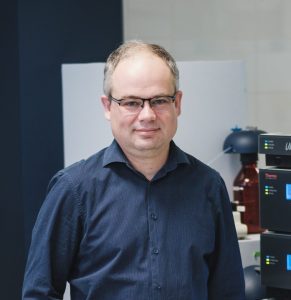We have asked your colleagues about their thoughts regarding the creation of two new interdisciplinary doctoral programmes, the Molecular and Translational Medicine at the Palacký University in Olomouc and Experimental and Clinical Oncology at the Charles University, two programmes created and operated under the auspices of the National Institute for Cancer Research.
-
Do you believe it is a good idea to have molecular medicine represented in the portfolio of Ph.D. programmes?
-
Where do you see the added value of bringing several areas of research into one doctoral programme?
-
How do you perceive the role of ‘clinicians’ and ‘non-clinicians’ in biomedical research?
 Pavel Bouchal
Pavel Bouchal
Node Brno, Faculty of Science of the Masaryk University
Primary focus: proteomics
- Definitely, because modern management of cancers is crucially based on the molecular methods: for example, the analysis of mutations of gene panels for diagnosis and therapy prediction, or targeted therapy based on humanised antibodies or antibody-drug conjugates.
- In a current science, a qualified researcher must master not only many sophisticated laboratory methods and related data analysis approaches, but also understand the perspective of colleagues from other fields with whom he/she participates in multidisciplinary collaboration. This is the principle of many outstanding studies in the field. Additionally, the researcher must be able to explain everything smoothly and flawlessly to the academic public from the position of the first or corresponding author of a resulting publication. A multidisciplinary Ph.D. programme is thus an ideal school for acquiring knowledge, establishing contacts, and to some extent it may also serve as a platform for a scientific collaboration.
- Basically, one cannot work without the other. The ‘clinician’ is aware of limitations of current approaches in the clinics, while the ‘non-clinician’ has various molecular, cellular, and analytical methods in his/her hands that can discover or suggest novel therapeutic options. If these two work in isolation, one without the other, there is a danger of getting them in stuck, each in his/her own ‘bubble’, without any benefit to the patients. Like in daily life, though, there must be an interest of both to listen the other to reach understanding in science.

Lenka Bešše
Node Brno, Faculty of Medicine of the Masaryk University
Primary focus: immunotherapy of tumours
- Inclusion of molecular medicine into the portfolio of Ph.D. programmes is nowadays in high demand. Given the growing awareness of the genetic and molecular foundation of various diseases, it is important that future scientists have access to instruction and research in this area. What I perceive as positive are for instance the opportunities to study these subjects abroad: they can help us learn about the current questions that molecular medicine is trying to answer and thereby also the issues we should study in our laboratories.
- The inclusion of several fields of research in one doctoral programme brings a number of advantages. Such programmes enable students to acquire a wider and interdisciplinary insight into the studied subject. It is nowadays quite clear that one person cannot be an expert in everything, but a broader awareness of a number of fields can help with addressing the right experts or with establishing interesting collaboration that can lead to innovative and exciting results.
- I find the presence of both clinicians and non-clinicians quite crucial. Clinicians, who work directly with patients, have a deeper understanding of their patients’ clinical needs and of the challenges their patients face. They are in the best position to formulate the questions that should be addressed. The non-clinicians, on the other hand, have the tools and knowledge needed to provide answers to these questions. Their goal should be, among others, to find the mechanisms underlying those issues and ways of resolving or at least alleviating some of the problems. These possibilities can be subsequently moved into the clinics.

